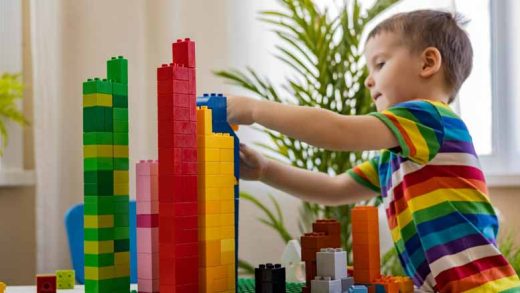During academic life, kids learn many subjects. Mathematics is one such subject. The fun fact is that maths is way more than a subject; it teaches you basic life skills. For example, it teaches you to count, calculate, keep records, and more. Aren’t all these things absolutely necessary for people to live in this society?
Maths is everywhere. It is a universal language that connects us and develops our basic skills. From calculating time to measuring weights, the importance of learning maths cannot be overstated. In this blog, let’s explore why maths is important for kids and what the benefits of maths are.
Why is Maths Important?
Maths is the study of quantities, numbers, and shapes, and their relationships and characteristics. Kids learn concepts, skills, and thinking processes that are relevant to everyday life through maths. It helps them understand the use of the numbers, patterns, and shapes they see in their everyday lives. They should have their basics clear.
Maths include algebra, geometry, trigonometry, calculus, statistics, arithmetics, and more. It combines abstract principles and practical applications. Learning maths is a key to understanding the world around us and solving problems across a variety of fields. Building a strong foundation in maths from an early age will benefit kids in all parts of their lives, including school and personal and professional life.
10 Reasons and Benefits for Kids to Learn Maths
For kids, it is important to understand maths. The following are the 10 benefits of maths:
- Develop Problem-Solving Skills
- Cognitive Development
- Time Management
- Developing Social Skills
- Boosts Creativity
- Financial Literacy
- Real-World Application
- Boosting Confidence
- Career Opportunities
- Encourage Critical Thinking and Generate Curiosity
One key benefit of introducing mathematics to kids early is the development of problem-solving skills. Maths teaches them to think logically and rationally, which helps them solve simple to complex problems.
Maths-related problems challenge kids to examine a situation, observe patterns, and find solutions. Kids learn how to solve problems involving counting, sorting, and categorising things. This helps them build their logical and analytical skills.
Solving maths questions requires focus and concentration. It keeps your mind active and healthy.
Research indicates that kids who engage in mathematical exercises enhance their knowledge and conceptual abilities. It is an essential skill for fields like science, technology, engineering, and maths (STEM).
Maths helps in simple and important activities like reading and telling the time. For example, reading the hands on an analog clock requires an understanding of fractions.
From scheduling daily work to long-term project planning, the ability to calculate and distribute time efficiently is strongly related to the use of mathematics. Kids who acquire these skills are more prepared for academic and professional responsibilities.
Learning maths enables children to acquire key social skills. When kids collaborate on maths activities, such as counting toys or dividing food evenly among friends, they learn how to collaborate and cooperate.
Playing maths games with others helps kids learn to take turns and share ideas. Talking about mathematics with friends, such as comparing how they solved a problem, allows kids to understand different ways of thinking while developing empathy.
Mathematics is more than memorising formulas. It also requires innovative thinking and imagination. Encouraging kids to explore maths-related subjects can boost their creativity, and solving maths problems in new ways can help develop their enthusiasm for the subject.
Kids learn maths principles via activities, such as building towers or making patterns with blocks. They relate to maths more deeply if they participate in fun learning activities.
Maths is essential for managing funds. It allows us to balance our budgets, avoid debt, and make sound financial decisions. Teaching kids about percentages for discount calculation, fractions for budget division, and multiplication helps in long-term savings.
Learning maths can be helpful when shopping. Simple maths skills are required for everyday tasks such as pricing comparisons when shopping. Quick computations of discounts and pricing can save you both time and money.
Learning maths provides you with practical skills. Moreover, many fields, like science, engineering, finance, and computer science, rely extensively on mathematical concepts.
Cooking also needs a solid understanding of mathematics to accurately measure and balance ingredients. It helps in perceiving and comprehending every aspect of the universe.
Introducing maths to kids makes them feel a sense of accomplishment when they solve problems and learn concepts from maths.
Children who struggle with mathematics frequently have negative perceptions about the subject. This hinders their learning and future performance. Clearing the basics can help in boosting confidence.
Kids must be exposed to maths at a young age to succeed academically. Maths-related skills, like critical thinking and problem-solving, are universal and beneficial in all aspects of life.
Kids who have a strong foundation in mathematics are better prepared to succeed in other disciplines, such as science and technology.
Through mathematics, kids learn to evaluate the validity of arguments in an age of information overload.
Maths is full of fascinating details and complex topics that generate curiosity. Exploring maths can result in the ability to connect the dots from numerous perspectives.
Maths support kids in their ability to think critically, solve problems, and reason logically. You can help your children by showing them how maths is used in daily life. You can also involve them in everyday maths-related activities.
Enrol your children at Kangaroo Kids International Preschool and watch them develop in a nurturing environment full of exciting maths activities. For admissions, contact us today!









